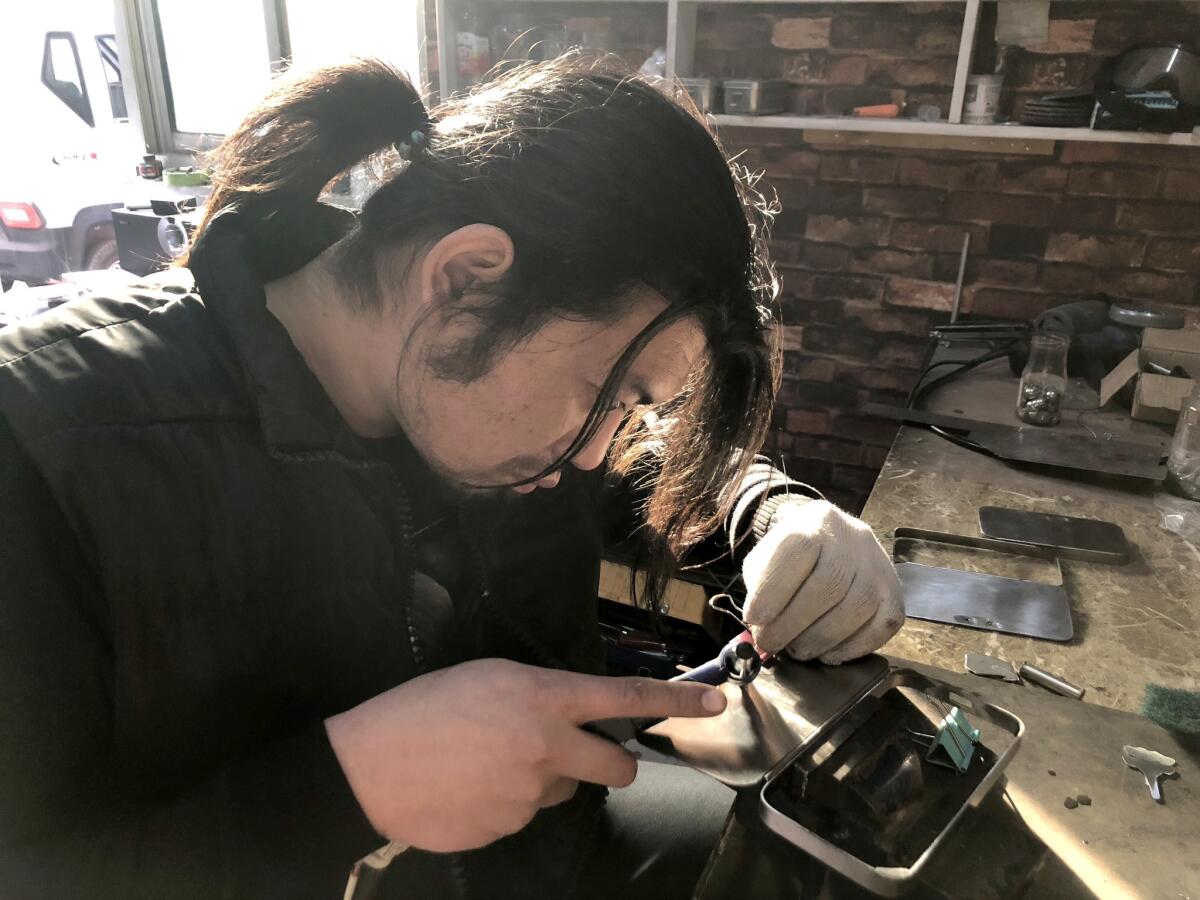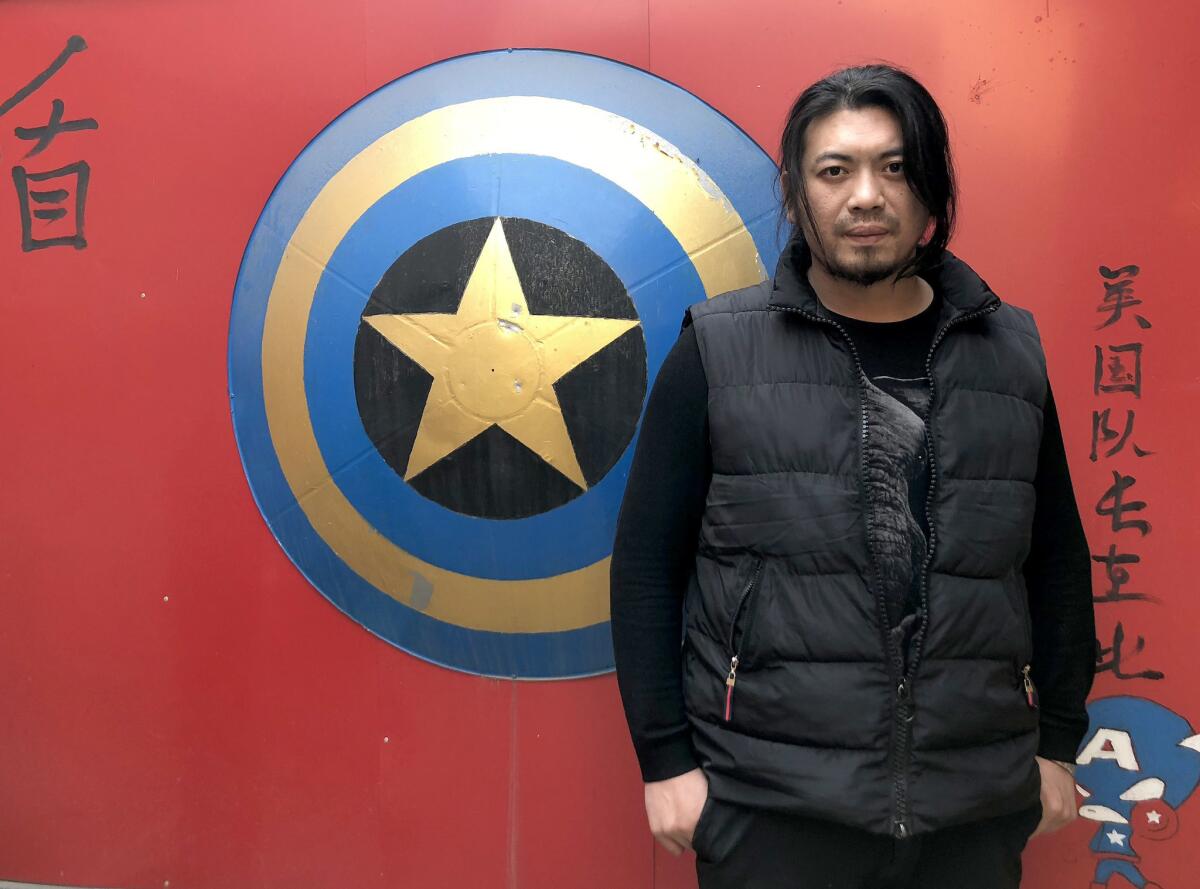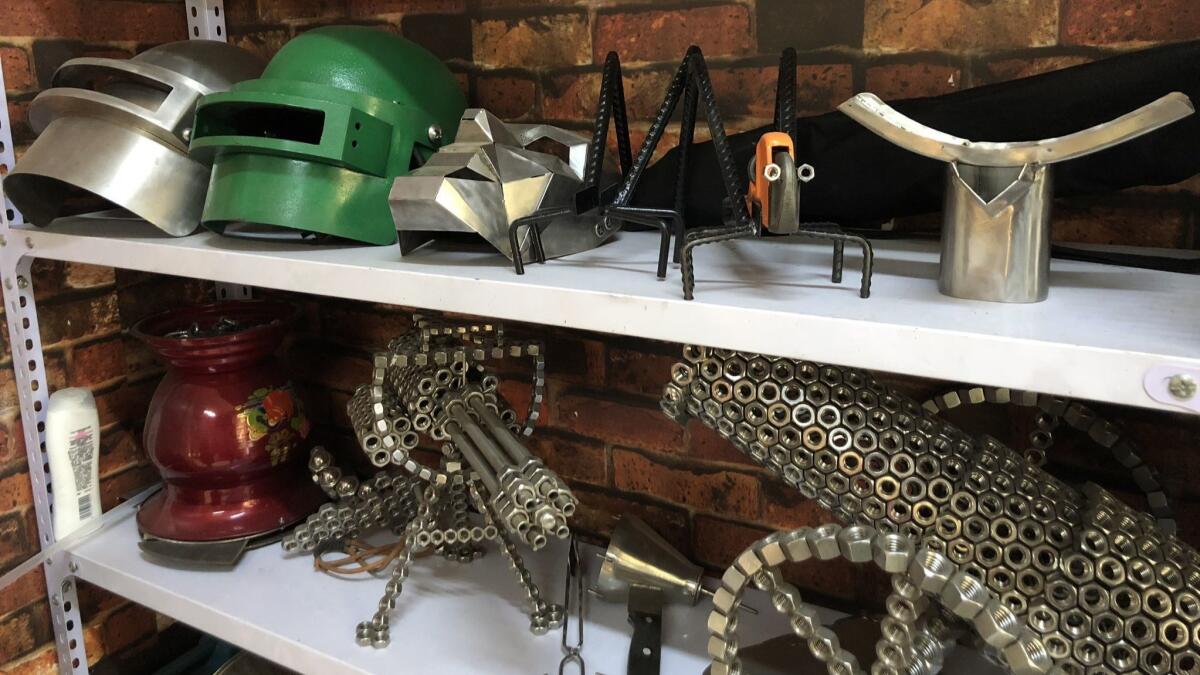How a welder with a useless invention — a meat cleaver cellphone cover — became an accidental viral video star

Geng Shuai is the Chinese inventor of useless things.
Reporting from Yang village, China — He was an ordinary welder in a boring job. Geng Shuai was about to turn 30 and knew that if he did not find an outlet for his passion to create things, he would be trapped in mediocrity. Then came his Einstein moment, during the mundane chore of cooking.
After chopping meat and vegetables with a rather blunt cleaver, he was busy cooking when his cellphone rang. When he hung up, he accidentally put the phone down on the cleaver. And on flicked a mental lightbulb.
The shapes synced perfectly.
“I realized, ‘Mmmm, you could make a cellphone cover out of that.’” Cleavers are common in Chinese kitchens, and Geng’s family happened to have a lot of old, blunt ones. So he took the leap.
“I liked it, so I went ahead and made it,” he said. “I thought it was quite handy. It was accidental design, not intentional.”
Geng put together a video to promote his product on the Chinese video-sharing and streaming app Kuaishou. Holding the cleaver by its wooden handle, he flipped open the cover to reveal the cellphone nestled inside, held it up to his ear then slid it into his pocket — all set to a song about a legendary ancient hero and his green dragon crescent blade.
Unlike Geng’s first invention, an automatic pancake press, the cleaver cellphone case went viral in two days.
But not in the way he had hoped.

Where he saw a bold design and an adventurous statement, Chinese netizens saw a hilarious failure. One of them wondered if you needed to buy a new pair of pants every time you tried to pocket the case. Another wondered how you avoided cutting off your ear. Better not try to fly with it, someone pointed out.
Geng saw the funny side. He also saw an opportunity. Maybe people were not lining up to buy his invention, but they were watching his video — by the millions. And they seemed to appreciate his cleaver design.
So his next design was a cleaver-comb. He blunted the edge of the cleaver, just as he had for the phone case. He livestreamed a video, dragging the metal comb through his lank hair.
Sure enough, money began to trickle in as newfound fans clicked on a button during his livestreams to send him virtual “gifts” in appreciation of his inventions. Then the money started to pour in.
Geng, 30, wears a ponytail and looms tall, with broad shoulders and a working man’s hands evidenced by the layer of black under each nail. But his smile, naive and hopeful, could belong to a small boy.
He grew up in a small village outside Beijing. At the main crossroads, papers litter the road and one of China’s ubiquitous scratchy speakers blares out a promotion for cheap mandarin oranges being sold from the back of a truck. An elderly man, face as wrinkled as a walnut, putters by on a three-wheeler.
Geng nearly let his dreams die here.

The son of a welder, he started cutting knives and guns from steel plate at age 7 using his father’s tools. He did well at school but found it a little narrow, convinced the wide world offered a better place to learn and create things. So he quit school after 9th grade and followed his father into a welding job — only to discover that it was narrow and repetitive too. He worked all day, rarely able to make things after work because the lights at the welding shop were switched off and the door was locked.
By 25, he was married with a child, and his life was beginning to look to him like a black tunnel leading nowhere great.
But the exhilaration of inventing his pancake press inspired him.
“I felt ecstatic because we are in a rural area and people have the stereotype that we’re just farmers, we’re country people and we don’t have the ability to make anything from scratch. People, especially your neighbors, think you are just an ordinary country guy who could never invent anything.” His family still uses the pancake press. Well, occasionally.
At almost 30, with a wife and two children to support, he quit his day job this year. His mother was appalled.
“She said, ‘You are not so young. You’re turning 30. You should not do that because there’s no future in it and it’s risky. You should find a stable job in a company and support the family.’”
She was right about the risk.
“I want to do something I have a passion to do. That’s what will drive me to work harder,” he says. He churned out a series of sculptures made entirely of welded-together nuts. Sales were disappointing.
Once he started to gain online followers, he was deluged with messages asking why his products cost so much, in a nation where cheap high-volume production is king.
“Every single product took a long time to make because it was handmade,” he says. Hardly anyone who inquired went on to buy.
“I don’t think I’m very good at sales tactics,” he acknowledges. He preferred dreaming up new creations.
But his videos grew more and more popular. The cleaver cellphone cover has been seen 24 million times, the comb video 8 million. Fans begged him never to make anything useful. One sent him a prestigious new-release cellphone, so that he could stream higher-quality videos.
“What I wanted to do at the very beginning was to sell inventions and bring convenience to people’s lives. But now I realize that people really like the way I present my inventions. And I also realize that this way, I get to do something new all the time.”
If sales of one of his products had taken off — say the cleaver cellphone cover selling for about $100 — he would probably have been stuck churning out thousands of them, day after day. But making a living by livestreaming has given him the freedom to hop from one wild idea to the next, without having to worry about whether it might sell — or might be practical.
In fact, the wilder and more impractical, the more his fans cheer him on with their gifts. He is living in a mad inventor’s fantasy land — and getting paid to do it.
In one video he dramatically flicked open a fan made of four cleavers; that got 5 million views. There was his “happy chair” — an uncomfortable metal frame with restraining straps and four robotic hands to tickle the soles of feet and underarms (14 million views). There was the earthquake-proof noodle bowl, allowing the table to jerk around, while the noodles remain steady enough to eat (20 million views). There was the heavy metal man-bag — an accessory in the shape of a mallet weighing several pounds — in which he stuffs a cellphone, a wallet and a roll of toilet paper (15 million views). There was a motorized wheelbarrow — comprising a motorbike welded onto a wheelbarrow. “This thing has a really bad temper,” he says (8 million views).
There’s his clunky shoe that converts into a stool (6 million views). A “bath sword” with a shampoo compartment and scrubber (14 million). And a battery-operated umbrella with a spinning canopy designed to flick the raindrops away. There is his zipper alarm, to avoid embarrassing wardrobe malfunctions.
His workshop is a little too neat for the average man cave, wall shelves stacked neatly with rows of nuts in jars arranged by size and shape, like candies kept out of reach of the children.

For months, his parents were bemused as to how his impractical inventions were bringing in almost twice what he made as a welder. But in March, his brother, Geng Da, 27, joined the operation; last month, his father, Wen Jun, 55, joined in too.
When he first created his cellphone cover, Geng applied for a patent only to be advised that his sales (about 20 so far) did not warrant a patent.
“But you never know when your product will go viral,” he says. A major online sales platform recently approached Geng with a product placement contract for his videos. And Kuaishou invited him to Beijing for a branding exercise and a string of interviews with Chinese media.
Now that he is bringing in a regular income, his mother accepts that this strange occupation might be a real job.
“But it took a while. Maybe she was worried that the neighbors would see it as an unprofessional job for someone who doesn’t take life seriously.”
His father, on a low wooden stool, carefully creates an array of components for the cleaver cellphone cover, the shriek of his angle-grinder rending the village air. He does not say much, but exudes an air of pride when asked about his son’s enterprise.
“I know my son has a really individual, original mind,” he says quietly.
As for Geng, he is happier than he has ever been.
“I never thought I could go this far. I feel this helped me to realize my dreams. I can try new things and be as creative and inventive as I want to be.”
Gaochao Zhang in The Times’ Beijing bureau contributed to this report.
Twitter: @RobynDixon_LAT
More to Read
Sign up for Essential California
The most important California stories and recommendations in your inbox every morning.
You may occasionally receive promotional content from the Los Angeles Times.










